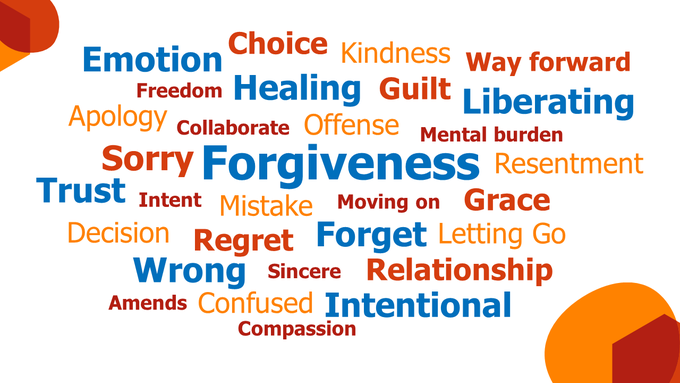War just a country away from mine, gun violence in the U.S., and the turbulent post-pandemic times we all face have challenged my limits. Writing this blog post, I've never felt more tested by this simple word: forgiveness.

These times have made me wonder and reflect on what role forgiveness plays in our lives, relations, teams, and work. We've all sat at both sides of that table – as a person who forgives, and as one who's being forgiven. It's not easy or pleasant being in either position.
It can tie into painful memories, shame, anger, regret, and the feeling of being lied to, exploited even, or not being good enough.
And if it feels like the scars and wounds are still too raw and recent, it might be unthinkable to forgive a person, a team or a community. It raises valid questions like:
The power of forgiveness lies in the benefits of releasing the emotions, resentment and vengeance a person is holding on to. No matter if the recipient deserves it or not.
It does not apply only to personal experiences but can also play an important role in restoring workplace relationships, and can help to create better-connected teams.
Here are some other questions to ponder. Is practicing forgiveness at work a strategy that can improve workplace dynamics? Can it restore harmony and help resolve issues of anger or resentment; can it counter the counter-productivity that is created?
"Forgiveness is not weak. It takes courage to face and overcome powerful emotions."
Desmond Tutu, South African clergyman and activist
Enabling the practice of forgiveness in the workplace positively affects and displays the company's core values. As much as the act of forgiveness is a personal, intimate act, it should equally be applied in a business environment.
Fostering a culture of forgiveness at the organizational level leads to establishing agreed responses to interpersonal offenses or perceived harm and wrongdoing in the workplace.
Efficient, valued employees need means and opportunities to resolve conflicts and practice compassion. Working in diverse teams, having short deadlines, and feeling pressured to achieve targets, the workplace can get stressful.
When tensions are high, if there's no resolve to tackle this, things can turn for the worse. It can affect productivity to the extent that it dissolves a team and eventually affects the bottom line.
I know, I've experienced it myself. Do what you love and love what you do – until it becomes unsustainable. It took me a long time to process and mourn the loss of a great team and a job I loved: to accept the past and move on. Forgiveness was far from my mind.
It did come later when I became more experienced. When I'd led teams myself and identified and reconciled all the anger and sadness that I didn't shoulder at that time.
When it came to the great job that I loved and lost, I forgave but I didn't forget. If my path ever crosses my former team leader, I know that I'll feel free of the burden of our past experiences. But I'll never trust this person again. The bonds, the connection and the team spirit were broken – and therefore cannot be restored.
It all led me to a realization that forgiveness is not a two-way process. It can be an intimate process: a sort of inventory of the past, and a search for ways of dealing with the whole package. Dealing with the person, the situation, and especially emotions that you've not shouldered yet.
When your emotions are not processed, they lead to similar situations – pain and anger that you pass along to the next team, next job, your family, and friends. It's a loss that keeps on lingering until you release it.
Consider the words of filmmaker Paul Boese: "Forgiveness does not change the past, but it does enlarge the future."
Forgiveness does not change what happened. It does not take away the pain or correct the hurtful events that happened.
But it does offer a way to acknowledge our feelings and reactions, understand the actions of the other person, and forgive them (for our peace of mind). Forgiveness for others is as much forgiveness for ourselves.
We're allowed to start with a clean slate, deciding for ourselves if our forgiveness fosters a further relationship with the person who hurt us or not. It's a process: lifelong learning that makes us stronger, more agile and more resilient.
It opens up future possibilities – how we act, how we respond to difficult situations and protect ourselves and our boundaries. And that's important for our wellbeing and mental health.
July 7 is Global Forgiveness Day. It's a great opportunity to lead by example. Let us give ourselves permission to show what empathy, care and forgiveness can achieve when we mindfully engage in the process. Let us be an example to others with our journeys to forgiveness.
During our latest #MTtalk Twitter chat, we discussed the sensitive issue of forgiving people who have wronged us. Here are all the questions we asked, and some of the best responses:

@ColfaxInsurance Forgiveness can be complicated and you might have to process a lot of emotions before you're able to actually reach the stage where you're ready for forgiveness.
@MikeB_MT The word that comes to mind for me is "grace." Grace for self and others is a balm for the chaos and stress of our lives. It's a place to start when forgiving ourselves and others.
@shamikv Maybe religious scriptures talk about forgiveness but it's universal. It's psychological.
@Yolande_MT It frees up mental bandwidth that you can expend on better, more pleasant things than people who wronged you. They shouldn't be given the opportunity to live in your head for a minute longer than they need to.
@HloniphileDlam7 It is actually a sign of maturity. We can't change people but we can keep ourselves in good spirits.
@J_Stephens_CPA Forgiving people is a sign of strength. Prudence should be used though to avoid being placed in a position to need to forgive someone repeatedly. It's why communication is key when we forgive.
@HloniphileDlam7 It depends. Some mistakes are not about trust. Once trust is broken, it becomes difficult to really restore... like broken glass.
@ThiamMeka2Gogue Forgiveness has to do with the past. It is letting it go. It only takes one to offer forgiveness. Trust has to do with the future: the person must show through their actions that they're trustworthy before you trust them again.
@ZalaB_MT Brands/businesses that engage in unethical acts, mislead their users and customers, or lie to get ahead of the competition. Those who treat their employees poorly, are not willing to change their ways when outed for inappropriate actions, or engage in harassing in any way.
@SarahH_MT Treating people disrespectfully is never OK. Any misdemeanors which fall under the heading of "intentional harm" to others would be hard to forgive – as is taking pleasure in others' pain or abuses of power. It's just wrong.
@DrSupriya_MT None of us is perfect, we all commit mistakes! The culture of forgiveness actually helps the team to go beyond reaction to response, giving people a chance to mend their ways and coexist.
@sumeetjindalin To be able to forgive, one has to have patience and tolerance with their behavior. It's an art to develop such behavior and, once done, people will come to you for solutions they couldn't get to.
@shamikv If forgiveness is your creed, it's a decision by default and needs no process. If it's a need, then it is a decision and may need a process to put things on record.
@Midgie_MT I see it as both. It is a decision to consciously let something go and forgive the person. It is a process because it may take time until the relationship is rebuilt to what it previously was.
@PG_pmp Just close your eyes and listen to your mind and heart, to deep dive on the decision taken.
@SoniaH_MT Acknowledge & understand your action, reflect on what you knew then vs. now, understand & accept the difference. Do not dwell in self-pity, and aim to not repeat the action by being mindful.
@lg217 You move forward by accepting the fact that life goes on. No one is going to move forward for you. You must learn to move forward on your own and learn to forgive yourself when you do something wrong.
@K_arenT With a clear consciousness. You make decisions with the resources available at the time.
@junkkDNA Introspection often helps unfold many things about ourselves. The process for forgiveness is just like that in fact, a part of introspection.
@ThiamMeka2Gogue Self-forgiveness gives a personal shift from self-blame to increased responsibility. By letting go of negative thoughts, shame, guilt, self-blame, and by having the capability to offer that forgiveness to others.
To read all the tweets, have a look at the Wakelet collection of this chat here.
In our next chat on July 1, we'll look at the thorny issue of labels. Do you wear yours proudly, or are they just about stereotypes?
In our Twitter poll this week, we’d like to know how you’d feel if you were "labeled" negatively.

Being able to apologize sincerely, without getting defensive or huffy, is a sign of maturity and strength. It shows that you're not too big or important to be vulnerable, too.
This is the third of a three-part series called Your Career. Recap on Part One (Resume Prep & Job Search), here; and Part 2 (Interviewing), here. Getting a new job can be exciting, confidence-building and a little bit nerve-wracking. It means you performed well at your interview and showed your potential new employer that you […]
In Part Two of our Career Journey series, our coaches share their top tips to help you prepare for an interview.